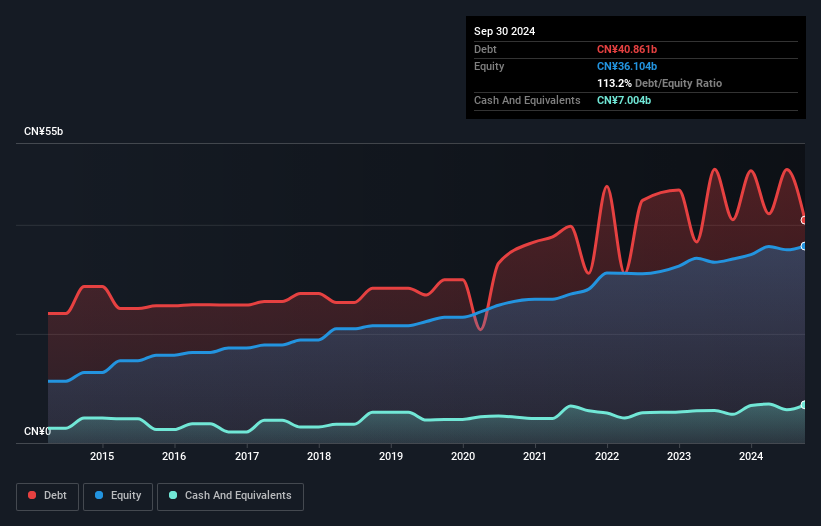Beijing Jingneng Clean Energy (HKG:579) Seems To Be Using A Lot Of Debt
The external fund manager backed by Berkshire Hathaway's Charlie Munger, Li Lu, makes no bones about it when he says 'The biggest investment risk is not the volatility of prices, but whether you will suffer a permanent loss of capital.' It's only natural to consider a company's balance sheet when you examine how risky it is, since debt is often involved when a business collapses. Importantly, Beijing Jingneng Clean Energy Co., Limited (HKG:579) does carry debt. But the real question is whether this debt is making the company risky.
When Is Debt A Problem?
Debt and other liabilities become risky for a business when it cannot easily fulfill those obligations, either with free cash flow or by raising capital at an attractive price. In the worst case scenario, a company can go bankrupt if it cannot pay its creditors. However, a more common (but still painful) scenario is that it has to raise new equity capital at a low price, thus permanently diluting shareholders. By replacing dilution, though, debt can be an extremely good tool for businesses that need capital to invest in growth at high rates of return. When we think about a company's use of debt, we first look at cash and debt together.
Check out our latest analysis for Beijing Jingneng Clean Energy
How Much Debt Does Beijing Jingneng Clean Energy Carry?
The chart below, which you can click on for greater detail, shows that Beijing Jingneng Clean Energy had CN¥40.9b in debt in September 2024; about the same as the year before. However, it does have CN¥7.00b in cash offsetting this, leading to net debt of about CN¥33.9b.

How Strong Is Beijing Jingneng Clean Energy's Balance Sheet?
The latest balance sheet data shows that Beijing Jingneng Clean Energy had liabilities of CN¥22.0b due within a year, and liabilities of CN¥38.7b falling due after that. Offsetting these obligations, it had cash of CN¥7.00b as well as receivables valued at CN¥12.3b due within 12 months. So its liabilities total CN¥41.4b more than the combination of its cash and short-term receivables.
This deficit casts a shadow over the CN¥14.5b company, like a colossus towering over mere mortals. So we'd watch its balance sheet closely, without a doubt. After all, Beijing Jingneng Clean Energy would likely require a major re-capitalisation if it had to pay its creditors today.
We measure a company's debt load relative to its earnings power by looking at its net debt divided by its earnings before interest, tax, depreciation, and amortization (EBITDA) and by calculating how easily its earnings before interest and tax (EBIT) cover its interest expense (interest cover). This way, we consider both the absolute quantum of the debt, as well as the interest rates paid on it.
Beijing Jingneng Clean Energy has a debt to EBITDA ratio of 3.7 and its EBIT covered its interest expense 4.5 times. Taken together this implies that, while we wouldn't want to see debt levels rise, we think it can handle its current leverage. Importantly Beijing Jingneng Clean Energy's EBIT was essentially flat over the last twelve months. Ideally it can diminish its debt load by kick-starting earnings growth. There's no doubt that we learn most about debt from the balance sheet. But it is future earnings, more than anything, that will determine Beijing Jingneng Clean Energy's ability to maintain a healthy balance sheet going forward. So if you want to see what the professionals think, you might find this free report on analyst profit forecasts to be interesting.
Finally, while the tax-man may adore accounting profits, lenders only accept cold hard cash. So it's worth checking how much of that EBIT is backed by free cash flow. Over the last three years, Beijing Jingneng Clean Energy reported free cash flow worth 6.2% of its EBIT, which is really quite low. For us, cash conversion that low sparks a little paranoia about is ability to extinguish debt.
Our View
Mulling over Beijing Jingneng Clean Energy's attempt at staying on top of its total liabilities, we're certainly not enthusiastic. Having said that, its ability to grow its EBIT isn't such a worry. We're quite clear that we consider Beijing Jingneng Clean Energy to be really rather risky, as a result of its balance sheet health. For this reason we're pretty cautious about the stock, and we think shareholders should keep a close eye on its liquidity. There's no doubt that we learn most about debt from the balance sheet. However, not all investment risk resides within the balance sheet - far from it. We've identified 1 warning sign with Beijing Jingneng Clean Energy , and understanding them should be part of your investment process.
If, after all that, you're more interested in a fast growing company with a rock-solid balance sheet, then check out our list of net cash growth stocks without delay.
Valuation is complex, but we're here to simplify it.
Discover if Beijing Jingneng Clean Energy might be undervalued or overvalued with our detailed analysis, featuring fair value estimates, potential risks, dividends, insider trades, and its financial condition.
Access Free AnalysisHave feedback on this article? Concerned about the content? Get in touch with us directly. Alternatively, email editorial-team (at) simplywallst.com.This article by Simply Wall St is general in nature. We provide commentary based on historical data and analyst forecasts only using an unbiased methodology and our articles are not intended to be financial advice. It does not constitute a recommendation to buy or sell any stock, and does not take account of your objectives, or your financial situation. We aim to bring you long-term focused analysis driven by fundamental data. Note that our analysis may not factor in the latest price-sensitive company announcements or qualitative material. Simply Wall St has no position in any stocks mentioned.
免責聲明:投資有風險,本文並非投資建議,以上內容不應被視為任何金融產品的購買或出售要約、建議或邀請,作者或其他用戶的任何相關討論、評論或帖子也不應被視為此類內容。本文僅供一般參考,不考慮您的個人投資目標、財務狀況或需求。TTM對信息的準確性和完整性不承擔任何責任或保證,投資者應自行研究並在投資前尋求專業建議。
熱議股票
- 1
- 2
- 3
- 4
- 5
- 6
- 7
- 8
- 9
- 10